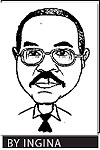It amuses me when I see kids of yesterday lamenting about their days of school punishment. If they knew what punishment meant in our time, they’d for ever keep mum.


It amuses me when I see kids of yesterday lamenting about their days of school punishment. If they knew what punishment meant in our time, they’d for ever keep mum.
For, in our days, we were treated like convicts who’d broken out of maximum-security confinement.
It is early 1959, for instance, and you are new in third year of primary school. Because in the years before you were in a school nearer home, you’ve not yet adjusted to trekking 12 kilometres to school. You wake up with the cocks, around five in the morning, but still arrive late.
This is because, in addition to the school being far, you’ll be weighed down by the heavy load of your lunch. Being the youngest of your siblings, you had to carry the heavy load into school, in the belief that you were too young to be punished.
Yet, everybody knew well that was not the case, even if it was true that your punishment was lighter than that meted out to others. ‘Lighter’, of course, is comparative, and this one could as well have been in comparison to death!
Take one typical day.
Because your old man knew that he wouldn’t always be there to wake you up, he’d charged an energetic domestic worker, Kimondi, with that job. Kimondi had been instructed to use any means to make sure you were not late.
So, at cockcrow, Kimondi raced out of his living quarters to the room where all of you five boys shared a floor for a bed. He prodded each one awake with his toe.
Sometimes you didn’t immediately wake up, only mumbling something and turning the other way.
Left with no alternative, Kimondi would go for his bucket of freezing water. If you’ve been to the slopes of Mount Muhabura, you know how icy that water can be. When it hit your face, you let out a yelp, like a puppy whose tail has been stepped on, and jumped out of bed.
Still, you thanked your gods because it could have been your dad. You knew him not to brook any dilly-dallying and would have used his cane.
And you knew a string of bones that had fallen victim to that cane, the latest being those of your immediate elder brother!
When your four brothers and two sisters were ready, you all trooped off with the eldest brother carrying the covered dish (igisorori) of your lunch first. Igisorori was for children of the sub-chief, of course.
Children of the commoners wrapped their lunch in banana leaves.
It is this gisorori that was passed to you on the final lap to school. Meanwhile, the others raced off, leaving you under the unforgiving weight of the gisorori that contained lunch for all seven of you.
By the time you reached school, the others had entered and were chanting mara (multiplication table).
As silently as possible, you tip-toed and placed the gisorori on the window-seal (there were no windows or doors, only openings).
Then you tiptoed to the doorway and, hiding behind the wall, softly knocked on the doorway-wall with your knuckles. The teacher ignored you until after the four-hour-long mara, when he picked his cane and walked to the door, in measured steps.
Peering around the wall, the teacher, Selesitini, enquired in a sarcastic voice: "Did I see a snake, or the fingers of a human being?” In a shaky voice, you croaked: "It’s me, sir!” and moved your trembling form forward to show yourself.
Then Selesitini yanked you forward and planted his shoes on your shoe-less feet, forcing you to yelp again. Looking ominously down at you, he barked: "C’mon, get up! Why are you sitting down?”
Of course, you were standing up and he was mocking your short stature.
"All right,” said Selesitini in mock resignation.
"if you don’t want to get up, I can help you go even lower,” and he started banging your head with his cane. When you tried to shield your head with your hands, he knocked them until they were bloody and the pain made you sit down.
However, sitting down was an insult to him and he roared: "Bottom!” You stood up and turned around for him to whip your behind until it, also, was bloody. You were only saved when he was distracted by commotion behind him.
"I saw you, Kiromba!” shouted Selestini as he turned to walk back to the pupil who was involved in the fracas. Seeing it would take long before reaching him, Selesitini picked a clay slate and hurled it at him with all his strength.
As the broken slate connected with the forehead, a jet of blood shot up and the boy fell on the floor. Selesitini directed the class prefect to go get herbs and rub at Kiromba’s bleeding cut and shouted: "Class, attention!” and it was back to lessons.
This scenario was an everyday occurrence. And Minega talks about ‘corporal punishment’?


